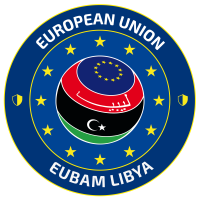EUBAM Enhances Libyan Border Security with Intensive Training

Tripoli, Libya – The European Union Border Assistance Mission (EUBAM) in Libya concluded a five-day intensive Border Management training course for fourteen middle-ranking officers from various Ministry of Interior agencies. The training, held at GASO Special Training Institute from January 26th to 30th, focused on developing crucial skills in document security, criminal analysis, integrated border management, leadership, decision-making, and the use of Geographic Information System (GIS) technology.
The program emphasised practical application through interactive exercises, case studies, and group discussions, enabling participants to translate their new knowledge into real-life scenarios. This hands-on approach aimed to improve organisational efficiency within Libyan law enforcement and cultivate future leaders in the field.

Border Management Training
The EUBAM Libya reiterated the mission's commitment to supporting Libya in enhancing border security. "This week has been a testament to the dedication and commitment of the officers from various Libyan border security agencies, and I commend them for their active participation and engagement," stated the Head of Mission, Jan Vyčítal. "EUBAM Libya remains steadfast in its commitment to supporting Libya’s integrated border security. This training course is just one example of our ongoing cooperation. We will continue to work closely with our Libyan partners to provide tailored support and expertise, contributing to a more secure and prosperous future for Libya."
The training proved highly valuable for the participants. Lieutenant Muhannad Al-Asifar, a participant in the course, highlighted its comprehensive nature. "This training provided comprehensive lectures on various aspects of border security management," he explained. "We covered document security, including the latest forgery and counterfeiting methods used by criminals, and learned procedures for detecting these fraudulent documents."
Al-Asifar also noted the training's focus on transnational organised crime, including international illicit drug and weapons trafficking, equipping security agencies to combat and prevent these crimes. Furthermore, participants were introduced to advanced technologies used in border management, such as geographic information systems and forensic analysis.
A key feature, according to Al-Asifar, was the use of visual presentations showcasing real-world border security operations within the European Union, providing valuable context and insights into best practices. The combination of practical exercises, advanced technology training, and real-world examples provided a robust learning experience for the Libyan officers.
The successful completion of this training underscores EUBAM Libya ongoing commitment to supporting Libya in its efforts to secure its borders. The mission will continue to work alongside Libyan authorities, providing tailored assistance and expertise to ensure a safe and prosperous future for the country.

Group Pic





